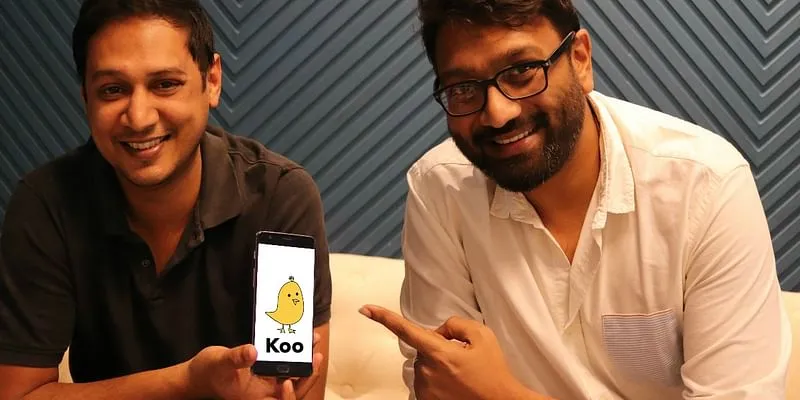Koo app: Vokal founders' Twitter-like for Bharat users wins PM Modi's praise on Mann ki Baat address
Koo app, a Twitter-like microblogging platform for Indian language speakers, won the Aatmanirbhar Bharat App Innovation Challenge in social category. PM Modi praised the app by the Vokal founders in his Mann ki Baat address.
Prime Minister Narendra Modi, in his Mann ki Baat address on Sunday, praised various Made in India apps that won the government's recently concluded Aatmanirbhar Bharat App Innovation Challenge. , an Indian language-based microblogging platform for Bharat users that won the Challenge under the social category, was one of the apps PM Modi recognised.
Built by entrepreneurs Aprameya Radhakrishna and Mayank Bidawatka, Koo, as PM Modi rightly noted, is a microblogging platform through which users can communicate in their mother tongue via text, audio, and videos.
Koo is currently available in four languages: Hindi, Tamil, Telugu, and Kannada.

Mayank Bidawatka and Apramaya R
Building a Twitter-like alternative
San Francisco-based micro-blogging site Twitter has over 330 million users worldwide. Of that, only a fraction of 70 million Kannada speakers would be tweeting in their native language on the social platform.
In a country like India, which has several regional languages, locals are most likely to exchange their views in their native languages rather than in English.
However, the offerings are limited, with only a handful of Indian startups catering to such a large population. Aprameya Radhakrishna and Mayank Bidawatka wanted to fill this gap and founded a Twitter-like platform for Bharat users in March 2020.
The serial entrepreneurs are also the founders of Vokal, a Quora-like platform for Indic languages, which they had launched in 2017. The duo also received feedback from several users on Vokal, the peer-to-peer knowledge sharing platform, that they needed a platform where they could express themselves as well.
What does it do?
Initially, the founders had built a button on the Vokal app itself. Having realised that Vokal was built in a Q&A format, like that of Quora, with videos and voices, the founders decided to develop an app where users can converse in their regional languages.
Available in four Indian languages, the homegrown Koo app enables users to ‘speak their minds’ using text, audio, and video.
Users can either convey their thoughts in 400 characters of text, or one-minute short audio or video Koos. It also features people’s feeds, 1-1 messaging, English to regional language keyboard, language news feeds, and hyper-local hashtags.
The platform boasts of influential individuals like Deputy Chief Minister of Karnataka Dr. CN Ashwathnarayan, Union Minister Ravishankar Prasad, Indian cricketers Anil Kumble and Javagal Shrinath, and spiritual teacher Sadguru Jaggi Vasudev, among others.
“We aim to bring India’s top influential people on the platform. The focus is on like-minded people to connect and follow one another,” says Aprameya.
According to Mayank, unlike other social media platforms, Koo allows the influencers to touch base with their local community where they can have conversations with their fans on topics of mutual interest.
“The kind of people on the platform are authors, poets, journalists, and politicians, who want to touch base with the right community on different ideas and trends,” he adds.
Most of the conversations on the Koo app revolve around daily thoughts, events, and news trends within the communities. The app has all content moderation policies in place, where people can be unfollowed, blocked, content can be blocked, comments can be blocked, or hidden as well.
“Apart from this, you also have the option of a people feed, where you get a list of people whom you can follow,” adds Mayank. The platform has a people scoring algorithm, that scores each person based on likes, interactions, feeds, and activities. This, Mayank says, is what differentiates the app from its competitors.

Mayank Bidawatka and Aprameya
The need for local apps
Amidst the COVID-19 pandemic and the subsequent lockdown, a significant rise in people seeking entertainment online emerged as one of the key trends.
According to data released by Carat India, smartphone usage increased by 1.5 hours a week, and social media consumption nearly doubled to 280 minutes a day. Of India’s 670 million internet users, a significant percentage live in rural areas, which saw a surge in demand for local language content.
Meanwhile, the Indian government’s decision to ban 59 Chinese apps, following the face-off of Indian and Chinese soldiers in Ladakh, further fueled the ‘Atmanirbhar Bharat’ and ‘Vokal for Local’ initiatives. Since July 2020, several entrepreneurs have jumped on this bandwagon and have introduced a slew of homegrown apps.
The Bengaluru-based micro-blogging platform is one of the winners of the AatmaNirbhar Bharat App Innovation Challenge under the social media category. The country-wide challenge, which was supported by the MeitY Startup Hub, along with Niti Aayog and Atal Innovation Mission, saw participation from nearly 7,000 tech entrepreneurs and startups across India.
On winning the challenge, Aprameya says, “We’re very excited about being one of the winners of the AatmaNirbhar App Challenge. PM Modi is giving startups, innovators, and entrepreneurs a very good platform to showcase their creativity, and we’re grateful for this opportunity. We look forward to taking Koo to a wider India that wants to connect with people in their mother tongue.”
Aprameya and Mayank believe that winning this challenge has given the team an additional boost and validation to focus deeper on solving for the language gap seen on the internet today.
Monetisation and future
Aprameya says the app is looking for monetisation at scale, and currently, it is exploring the advertising model. However, the co-founders want to follow a more targeted approach, focussing more on the demography and interests of their users.
“The idea is to have an influencer base that has a deeper connection with people in their local languages,” explains Aprameya.
Currently, the platform has close to 200,000 downloads and has users who spent time on the app in double digits. It is also one of the top ten apps on the Google Play Store. It competes with the likes of ShareChat and Chingari, who also rose to prominence after the ban of Chinese apps.
Koo will soon have live chat rooms and stories, which will focus on increasing user engagement on the platform. “There clearly is a need for a platform where people can express and interact with their community in a language they are comfortable with; we see Koo doing that,” Aprameya says.
Edited by Suman Singh and Tenzin Pema








